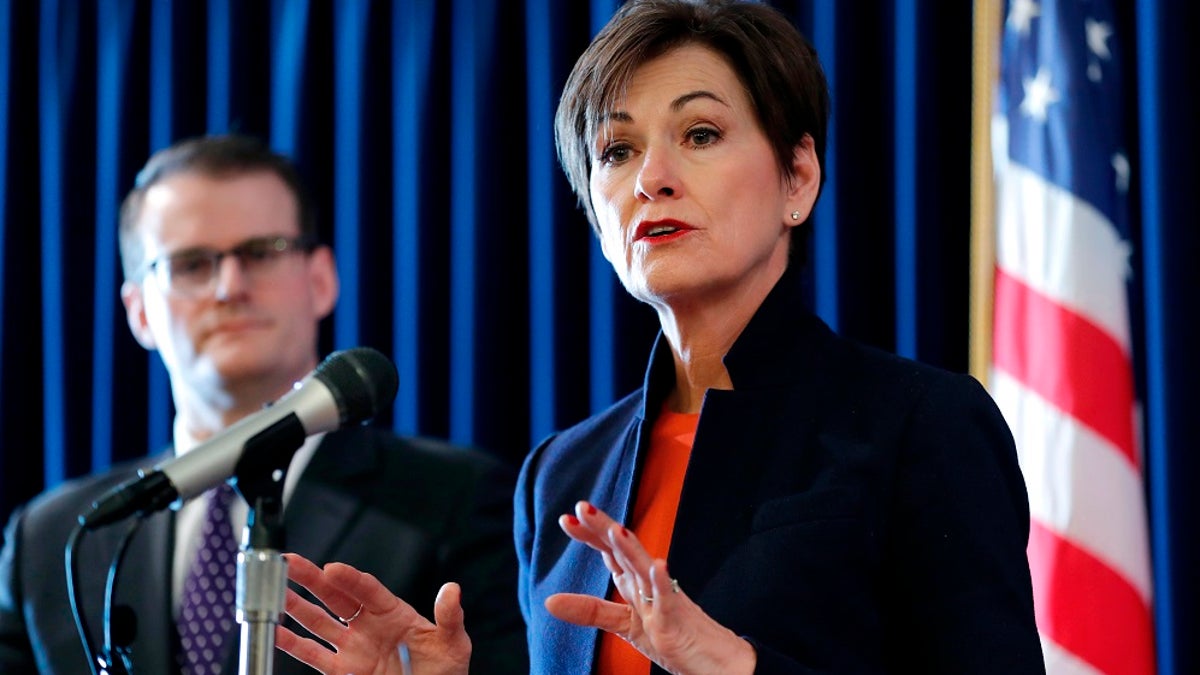
Iowa Gov. Kim Reynolds has not said whether or not she plans to sign the bill into law. (AP)
Lawmakers in Iowa this week passed the so-called “heartbeat bill” which would ban abortion as soon as a fetal heartbeat is detected, or roughly around the sixth week of pregnancy.
The bill is now headed to Republican Gov. Kim Reynolds, who announced Friday she will sign the measure. Once enacted, the legislation will arguably become one of the most restrictive abortion laws in the country.
The House passed the legislation on Tuesday night with a 51-46 vote, Iowa Public Radio reported. It was debated for more than eight hours before House representatives reached a decision. The bill then passed the Senate early Wednesday morning with a 27-19 vote.
The bill bans abortion in all cases after six weeks of pregnancy, which critics of the legislation argue is before most women are aware they are pregnant. Currently, a woman can receive an abortion in the state up to 20 weeks of pregnancy.
However, the bill would not ban abortion after six weeks in all cases -- some exemptions include instances of rape, incest, fetal abnormalities or to save the mother’s life, according to the bill.
Supporters of the bill said the legislation would likely be challenged if signed into law, possibly making it to the Supreme Court. But a legal fight would be welcome, some lawmakers say.
“This bill will be the vehicle that will ultimately provide change and provide the opportunity to overturn Roe v. Wade. There’s nothing hidden here about the agenda. You know, today the pro-life movement won a battle, but the war rages on. My Republican colleagues, this is the vote of your career,” Republican Sen. Rick Bertrand said.
SUPREME COURT TO HEAR ANTI-ABORTION AND FREE SPEECH CASE: A BREAKDOWN OF NIFLA V. BECERRA
“It is time for the Supreme Court to weigh in on the issue of life. It has taken decades for the science to catch up to what many have believed all along: that she’s a baby,” Rep. Shannon Lundgren, R-Iowa, said, according to Iowa Public Radio.
Opponents, such as Democratic Rep. Beth Wessel-Kroeschell, argued that only women and medical professionals should make decisions regarding abortion.
“We may disagree, and we clearly do disagree, on this issue,” Wessel-Kroeschell said. “But we have to look at what’s actually the right thing to do, and who should be making these decisions, and it is not us."
Organizations such as Planned Parenthood have also come out against the proposed legislation, calling it “an extreme and draconian policy that takes aim at a woman’s right to control her own body, life, and future,” Dawn Laguens, the executive vice president of Planned Parenthood, told Fox News in a statement.
“This bill is one more example of state politicians, emboldened by the Trump-Pence administration, carrying out policy after policy that strip away people’s freedoms and access to care. The right to control your body includes the right to access safe, legal abortion. Your body is your own, if it is not, we cannot be truly free or equal,” the statement continued.
The Associated Press contributed to this report.













































